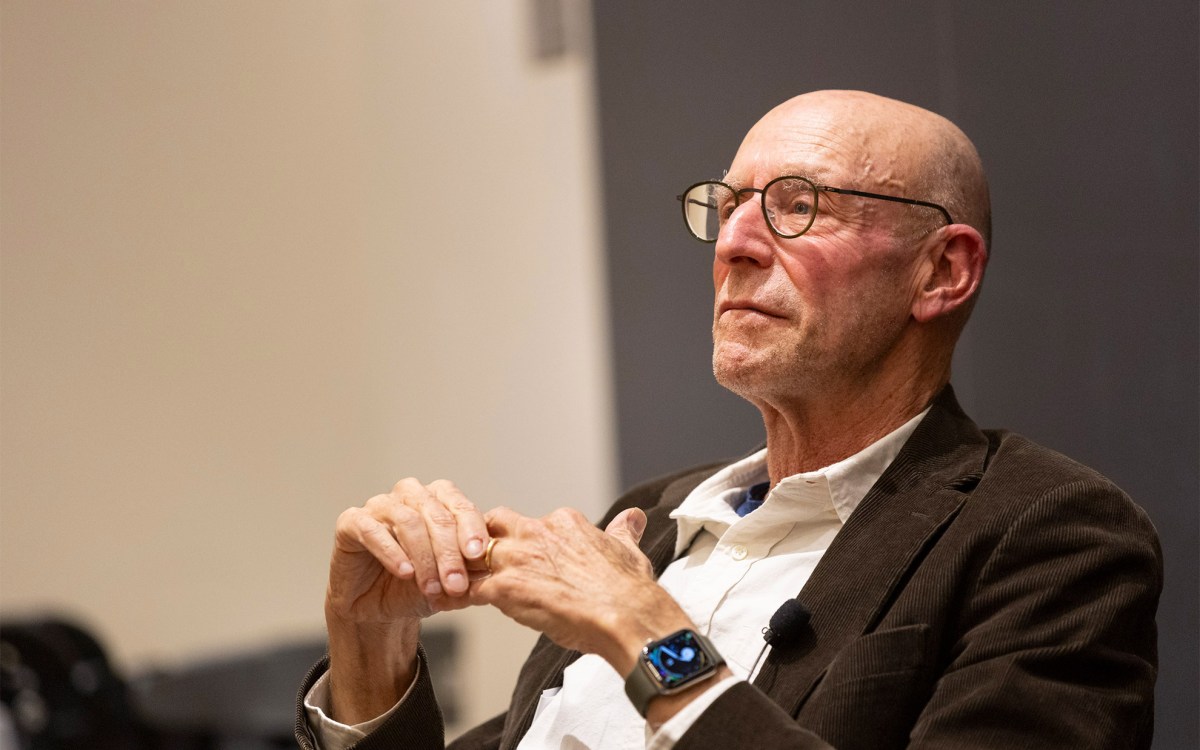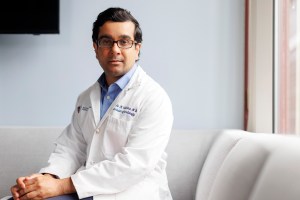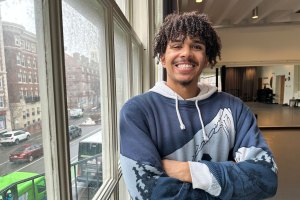Science & Tech
-

What exactly is consciousness? (And does my Venus flytrap have it too?)
In new book, author Michael Pollan explores nonhuman sentience, stream of thought, AI
-

Can a chatbot be a co-author?
Physicists take souped-up ChatGPT out for a spin, return home with significant discovery

-

Preserving learning in the age of AI shortcuts
In podcast, teachers talk about how they’re using technology to supercharge critical thinking rather than replace it
-

A ‘cocktail’ recipe for brain cells
Stem cell biologists discover how to regenerate type damaged in ALS, spinal cord injuries

-

When you do the math, humans still rule
Harvard’s Lauren Williams, a MacArthur ‘genius,’ joins international effort to challenge notions of AI supremacy
-

‘Imagination’
Less like a picture, more like a video game? Cognitive scientist explains how we ‘see’ what isn’t real.
-
Report documents importance of playlists
Drawing from an early-adopter survey conducted through Gartner, Harvard College student Derek Slater and Mike McGuire, Gartner research director, found that consumer-to-consumer recommendation tools, like playlists, enable consumers to actively…
-
Making the world’s smallest gadgets even smaller
You may not have noticed, but the smallest revolution in world history is under way. Laboratories and factories have begun to make medical sensors and computer-chip components smaller than a…
-
Early steps discovered in protein-making process
Translation, the synthesis of protein from an mRNA template, has long been considered a benign sequela to transcription. After all, dysregulation of transcription causes a multitude of human disorders, including…
-
A star that looks like a planet
Astronomers using NASA’s Spitzer Space Telescope have discovered a remarkably small brown dwarf surrounded by a dusty disk. The brown dwarf contains only about eight times the mass of Jupiter,…
-
Einstein’s rings in space
In a 1936 paper, Albert Einstein described how the gravitational field from a massive object can warp space and thereby deflect light. In special cases, the light from a distant…
-
A harvest of dozens of new stars
A new infrared image of the reflection nebula NGC 1333, located about 1,000 light-years from Earth in the constellation Perseus, reveals dozens of stars like the Sun but much younger.…
-
Cigarette manufacturers developed candy-flavored brands to target youth
Despite assurances from cigarette makers that they no longer target the youth market, Harvard School of Public Health researchers found that new brands are being marketed to young smokers and…
-
Survey: Many seniors don’t understand Medicare drug benefit
When asked how well they understand the new Medicare drug benefit, more than six in 10 seniors (61 percent) say ‘not too well’ or ‘not at all,’ while more than…
-
Space telescope captures cosmic ‘Mountains of Creation’
Captured by the Spitzer Space Telescope’s infrared eyes, a new majestic image resembles the iconic “Pillars of Creation” picture taken of the Eagle Nebula in visible light by NASA’s Hubble…
-
Cosmic cloudshine
Hubble’s iconic images include many shots of cosmic clouds of gas and dust called nebulae. For example, the famous “Pillars of Creation” mark the birthplace of new stars within the…
-
Study shows escalating climate change impacts
The Center for Health and the Global Environment at Harvard Medical School, along with co-sponsors Swiss Re and the United Nations Development Programme, has released a study showing that climate…
-
Taking a look at how ant (and human) societies might grow
Edward O. Wilson has learned a great deal about life by studying ant societies. In this knowledge, he finds parallels between the social interactions of insects and those of birds,…
-
First edition of HapMap released
A flurry of high-profile scientific manuscripts published in October 2005 describe both the content and uses of HapMap, a catalog that maps human genetic variation and relates it both to…
-
Mercury advisories may do more harm than good
A study warns that if advisories cause fish consumption in the general public to drop out of fear about the effects of mercury, substantial nutritional benefits could be lost. The…
-
It takes three Smithsonian observatories to decipher one mystery object
In an exercise that demonstrates the power of a multiwavelength investigation using diverse facilities, astronomers at the Harvard-Smithsonian Center for Astrophysics (CfA) have deciphered the true nature of a mysterious…
-
Black holes aren’t so black
As gas is pulled into a black hole by its strong gravitational force, the gas heats up and radiates. That radiation can be used to illuminate the black hole and…
-
Lukin illuminates quantum science
Mikhail Lukin thinks that devices based on quantum science are at the same stage as radios were about 100 years ago. To catch up, the recently tenured professor of physics…
-
Born to add
In experiments, 5-year-olds, who had no real experience using number symbols, “added” two arrays of dots and compared them to a third array. When researchers replaced the third array of…
-
Ferreting out the first stars
The first stars are so distant and formed so long ago that they are invisible to our best telescopes. Until they explode. Hypernovas (more powerful cousins of supernovas) and their…
-
First baby photo of stellar twins
Newborn stars are difficult to photograph. They tend to hide in the nebulous stellar nurseries where they formed, enshrouded by thick layers of dust. Now, Smithsonian astronomer T.K. Sridharan (Harvard-Smithsonian…
-
Survey of Katrina evacuees in Houston: Half trapped in homes waited three days or more for rescue
One-third (34 percent) of Katrina evacuees in a survey reported that they were trapped in their homes and had to be rescued. Half (50 percent) of those who were trapped…
-
Fastest pulsar speeding out of galaxy
A speeding, superdense neutron star somehow got a powerful “kick” that is propelling it completely out of our Milky Way Galaxy into the cold vastness of intergalactic space. Its discovery…
-
How to build a big star
The most massive stars in our galaxy weigh as much as 100 small stars like the Sun. How do such monsters form? Do they grow rapidly by swallowing smaller protostars…
-
Genome scanning technique spots disease risk
A new technique, admixture mapping, takes advantage of the higher-risk genetic segments from one population that show up in the other through generations of racial mixing. The presence of higher-risk…
-
Harvard, MGH researchers track egg cell production to marrow
In a series of experiments on sterile female mice, Massachusetts General Hospital (MGH) researchers were able to restore egg production by transplanting bone marrow from fertile mice. The researchers believe…
-
Implantable chips bear promise, but privacy standards needed
Writing in the July 28, 2005 edition of the New England Journal of Medicine, John Halamka, M.D., chief information officer at BIDMC and Harvard Medical School and an emergency room…
-
Judah M. Folkman, MD
In the early 1970s Folkman refined his theory that tumors have the capability to grow their own blood vessels, thereby obtaining the nourishment they need to keep growing in a body. Folkman never quit thinking about why this happens and how he might use that information to treat cancer patients.
-
Witnessing gun violence significantly increases the likelihood that a child will also commit violent crimes
“Based on this study’s results, showing the importance of personal contact with violence, the best model for violence may be that of a socially infectious disease,” says Felton Earls, MD,…
-
Amateur and professional astronomers team to find new planet
Astronomer Scott Gaudi of the Harvard-Smithsonian Center for Astrophysics believes that microlensing has the potential for wide use in the future: “With improving technologies and techniques, the first Earth-sized planet…
-
Robotic telescope penetrates heart of universe’s most powerful explosion
Cullen Blake, a graduate student at the Harvard-Smithsonian Center for Astrophysics and lead author on the paper, said that the simultaneous observation of infrared light with a gamma-ray burst was…


